#without turning it into a black and white right and wrong narrative
Explore tagged Tumblr posts
Text
every time I come across somebody who foams rabidly at the mouth for Langdon but despises Santos I have to resist the urge to bite my phone in half, like i hate to break it to you but that’s the same character in two different fonts
langdon is struggling with a very real and very serious drug addiction which makes him dangerous at his job, and santos is on her first day at a new job where her mask of over-confidence also means she makes mistakes which she is rightly corrected for
neither of them are evil or bad, neither of them is a villain, they’re both incredibly empathetic people who went into a profession to help others because it gives them a sense of fulfillment
#like yeah i just think if you can’t handle conflict between characters#without turning it into a black and white right and wrong narrative#then you’re childish#and reductive#somebody can be a good person but do bad things#somebody can make mistakes on their FIRST DAY OF WORK#the pitt#text#tiger talks#frank langdon#trinity santos
67 notes
·
View notes
Text
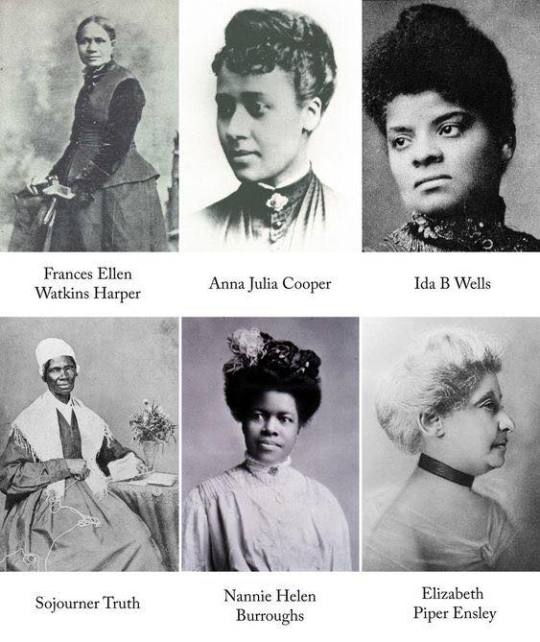
A Historical Deep Dive into the Founders of Black Womanism & Modern Feminism
Six African American Suffragettes Mainstream History Tried to Forget
These amazing Black American women each advanced the principles of modern feminism and Black womanism by insisting on an intersectional approach to activism. They understood that the struggles of race and gender were intertwined, and that the liberation of Black women was essential. Their writings, speeches, and actions have continued to inspire movements addressing systemic inequities, while affirming the voices of marginalized women who have shaped society. Through their amazing work, they have expanded the scope of womanism and intersectional feminism to include racial justice, making it more inclusive and transformative.
Anna Julia Cooper (1858–1964)
Quote: “The cause of freedom is not the cause of a race or a sect, a party or a class—it is the cause of humankind, the very birthright of humanity.”
Contribution: Anna Julia Cooper was an educator, scholar, and advocate for Black women’s empowerment. Her book A Voice from the South by a Black Woman of the South (1892) is one of the earliest articulations of Black feminist thought. She emphasized the intellectual and cultural contributions of Black women and argued that their liberation was essential to societal progress. Cooper believed education was the key to uplifting African Americans and worked tirelessly to improve opportunities for women and girls, including founding organizations for Black women’s higher education. Her work challenged both racism and sexism, laying the intellectual foundation for modern Black womanism.
Frances Ellen Watkins Harper (1825–1911)
Quote: “We are all bound together in one great bundle of humanity, and society cannot trample on the weakest and feeblest of its members without receiving the curse in its own soul.”
Contribution: Frances Ellen Watkins Harper was a poet, author, and orator whose work intertwined abolitionism, suffrage, and temperance advocacy. A prominent member of the American Equal Rights Association, she fought for universal suffrage, arguing that Black women’s voices were crucial in shaping a just society. Her 1866 speech at the National Woman’s Rights Convention emphasized the need for solidarity among marginalized groups, highlighting the racial disparities within the feminist movement. Harper’s writings, including her novel Iola Leroy, offered early depictions of Black womanhood and resilience, paving the way for Black feminist literature and thought.
Ida B. Wells (1862–1931)
Quote: “The way to right wrongs is to turn the light of truth upon them.”
Contribution: Ida B. Wells was a fearless journalist, educator, and anti-lynching activist who co-founded the National Association for the Advancement of Colored People (NAACP). Her investigative reporting exposed the widespread violence and racism faced by African Americans, particularly lynchings. As a suffragette, Wells insisted on addressing the intersection of race and gender in the fight for women’s voting rights. At the 1913 Women’s Suffrage Parade in Washington, D.C., she famously defied instructions to march in a segregated section and joined the Illinois delegation at the front, demanding recognition for Black women in the feminist movement. Her activism laid the groundwork for modern feminisms inclusion of intersectionality, emphasizing the dual oppressions faced by Black women.
Sojourner Truth (1797–1883)
Quote: “Ain’t I a Woman?”
Contribution: Born into slavery, Sojourner Truth became a powerful voice for abolition, women's rights, and racial justice after gaining her freedom. Her famous 1851 speech, "Ain’t I a Woman?" delivered at a women's rights convention in Akron, Ohio, directly challenged the exclusion of Black women from the feminist narrative. She highlighted the unique struggles of Black women, who faced both racism and sexism, calling out the hypocrisy of a movement that often-centered white women’s experiences. Truth’s legacy lies in her insistence on equality for all, inspiring future generations to confront the intersecting oppressions of race and gender in their advocacy.
Nanny Helen Burroughs (1879–1961)
Quote: “We specialize in the wholly impossible.”
Contribution: Nanny Helen Burroughs was an educator, activist, and founder of the National Training School for Women and Girls in Washington, D.C., which emphasized self-sufficiency and vocational training for African American women. She championed the "Three B's" of her educational philosophy: Bible, bath, and broom, advocating for spiritual, personal, and professional discipline. Burroughs was also a leader in the Women's Convention Auxiliary of the National Baptist Convention, where she pushed for the inclusion of women's voices in church leadership. Her dedication to empowering Black women as agents of social change influenced both the feminist and civil rights movements, promoting a vision of racial and gender equality.
Elizabeth Piper Ensley (1847–1919)
Quote: “The ballot in the hands of a woman means power added to influence.”
Contribution: Elizabeth Piper Ensley was a suffragist and civil rights activist who played a pivotal role in securing women’s suffrage in Colorado in 1893, making it one of the first states to grant women the vote. As a Black woman operating in the predominantly white suffrage movement, Ensley worked to bridge racial and class divides, emphasizing the importance of political power for marginalized groups. She was an active member of the Colorado Non-Partisan Equal Suffrage Association and focused on voter education to ensure that women, especially women of color, could fully participate in the democratic process. Ensley’s legacy highlights the importance of coalition-building in achieving systemic change.
To honor these pioneers, we must continue to amplify Black women's voices, prioritizing intersectionality, and combat systemic inequalities in race, gender, and class.
Modern black womanism and feminist activism can expand upon these little-known founders of woman's rights by continuously working on an addressing the disparities in education, healthcare, and economic opportunities for marginalized communities. Supporting Black Woman-led organizations, fostering inclusive black femme leadership, and embracing allyship will always be vital.
Additionally, when we continuously elevate their contributions in social media or multi-media art through various platforms, and academic curriculum we ensure their legacies continuously inspire future generations. By integrating their principles into feminism and advocating for collective liberation, women and feminine allies can continue their fight for justice, equity, and feminine empowerment, hand forging a society, by blood, sweat, bones and tears where all women can thrive, free from oppression.
#black femininity#womanism#womanist#intersectional feminism#intersectionality#intersectional politics#women's suffrage#suffragette#suffrage movement#suffragists#witches of color#feminist#divine feminine#black history month#black beauty#black girl magic#vintage black women#black women in history#african american history#hoodoo community#hoodoo heritage month#feminism#radical feminism#radical feminists do interact#social justice#racial justice#sexism#gender issues#toxic masculinity#patriarchy
618 notes
·
View notes
Text
Jack & Joker Restarted the Story!
The first and fifth episodes of Jack & Joker are twins.
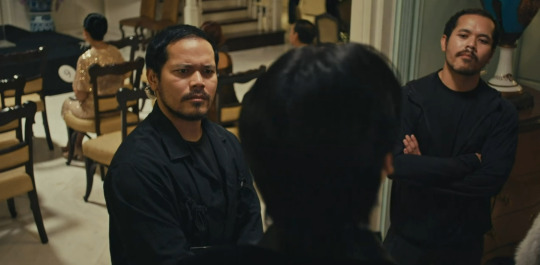
Jack and Joke originally met in a bar in the first episode.
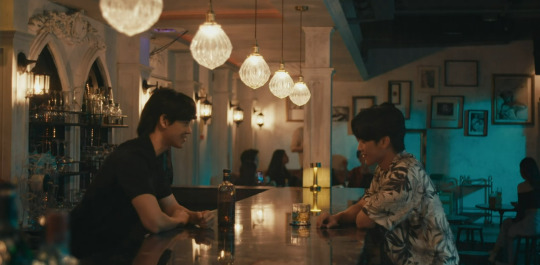
And five years later, they go back to that same bar.

And each time, Jack helps Joke escape his Terrible, Horrible, No Good, Very Bad Day.

(Peaceful Property's Suradech, is that you player?!)
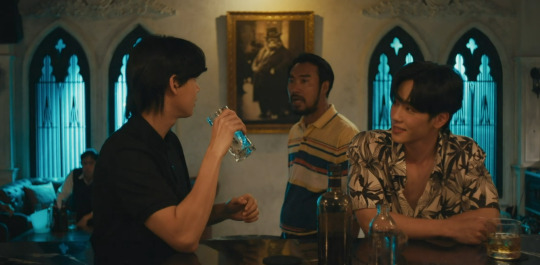
Both times, Joke stole something. The first time was a wallet and the second was a necklace.

And in a sense, he stole both items to right a wrong. The wallet was Carbon's, who had been a jerk to Jack all night, and the necklace was never supposed to be stolen in the first place. But both of the items lead to Rose meeting Jack.

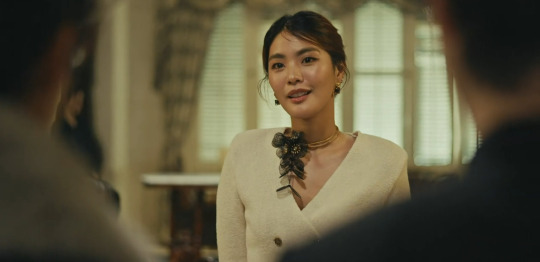
The boys have to fight off danger in both episodes.
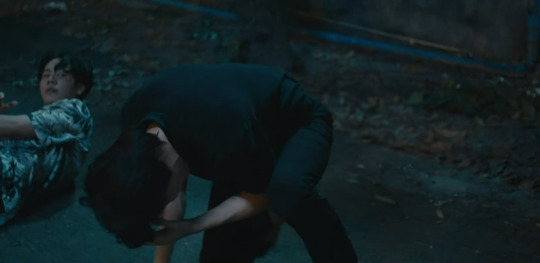
But five years later, Joke actually helps Jack.
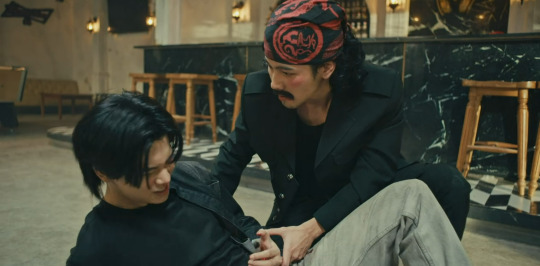
And instead of Joke going home to get yelled at and Jack's grandmother patching him up,

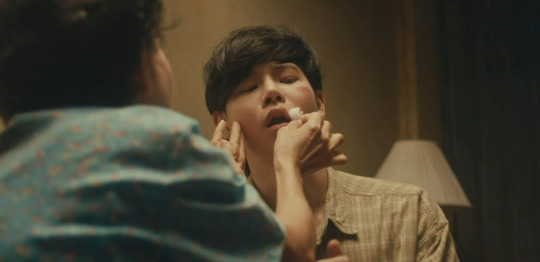
They patch each other up in episode five.


Yet Jack's ring still gets taken. He had to give it to Boss the first episode, and Hope took it from Joke in the fifth episode.

And of course Joke is still pulling a con in his signature red.
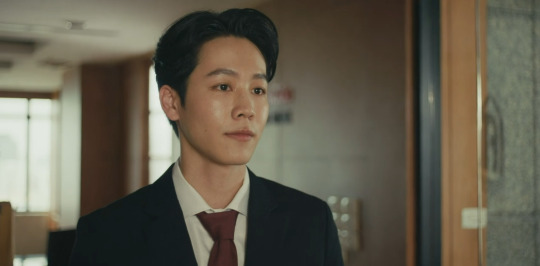
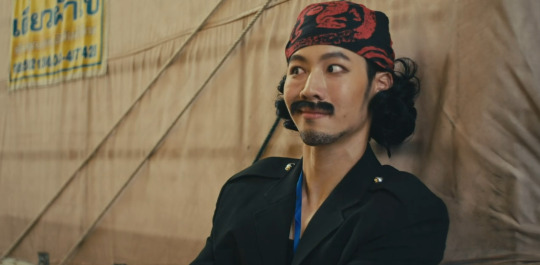
Oh, and Jack and Joke are still making heart-emoji eyes at each other in front of other people.

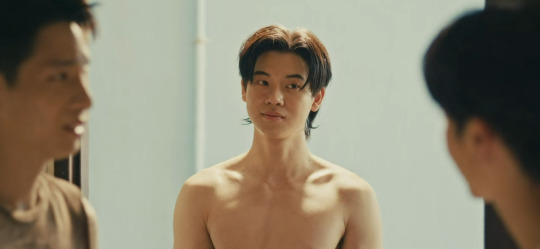
But all these similarities help us see the biggest difference because in the first episode, Jack was wearing a blue shirt, but once he entered the car and into the deal to pay off his parents' debt, he turned black, and Joke was in a white top but lit up red in the police car.
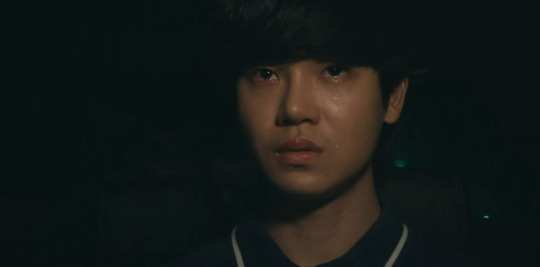

And at the end of the fifth episode, the boys are still in their colors, but Jack is just a teeny tiny bit brighter and the red is only a teeny tiny bit on Joke (his face).

And it's all because the first narrative arc is complete, which is why we had to go back to the very beginning (go back and look at their colors in the bar the first time they met).
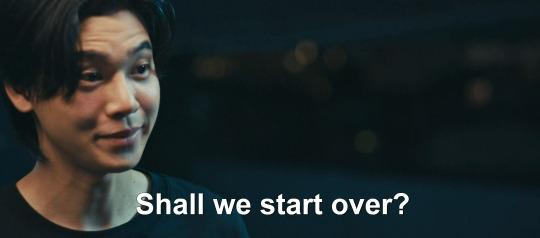
They got to rewrite their history.
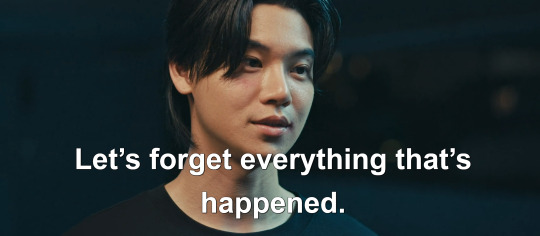
The first time they met, Joke got in a taxi without saying goodbye and left Jack with Rose, but they met again at the bank.

Now five years later, Joke wrote an entire letter saying goodbye to Jack, but the issue in the original timeline began because Joke made a similar choice. Joke should've never left Jack because Jack makes Joke better.

So even in their redo, fate lets them meet again. And it is fate because only destiny would let the boys meet again in a "couple's suite" with that room number.
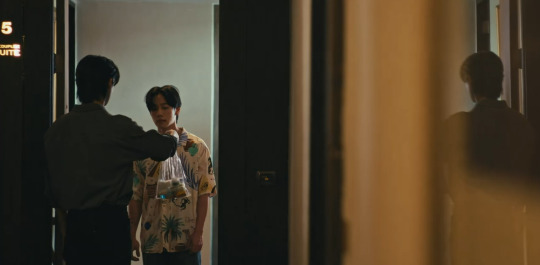
The first episode ended with Jack never wanting to see Joke again, and the boys parted ways to live the next five years of their lives separately and miserable. Episode five allowed Jack and Joke to go back to that bar where it all began for them and get it right this time, so instead of Jack vowing to never forgive Joke like their original relationship ended, in episode five, after five years, Jack forgives Joke.

And the boys leave with each other because they are better, together.

They need each other for the next part of the narrative, so the show and destiny restarted their story at the perfect time to make sure they were a team to beat whatever is coming their way.

*chef's kiss*
#jack and joker#u steal my heart#big brain energy writers!#the numbers mean things#the colors mean things#this story is sooooo amazing#color coded boys in love#the number five is perfection#and that's what this episode was
344 notes
·
View notes
Text

What makes me crazy about Arcane season 2 is that, if you watch only the final episode of season 2, there is nothing wrong with this interpretation of the themes or of Viktor's character. It is, obviously, a beautiful - if simple - sentiment that we all love to see in stories. And Viktor shown as the unloved misunderstood villain next to Jayce's unquestionably heroic narrative and forgiving heart supports this statement, as well as feeding the fire of jay//vik shippers.
This is assuming that season 2, and the final act of season 2 in particular, was written as a proper continuation and conclusion to the whole of Arcane. Which it was not.
Season 1 Viktor is pursuing change and "evolution" at first because he loves science and wants to help the undercity, and then later, because he is dying. He doesn't want to die without leaving behind a legacy. He doesn't want to die, period. What does that have to do with him not feeling loved? Interpreting Viktor's attempts to survive and his desire for legacy and success as "wrong" or something he should not have done instead of seeking love in Jayce or Sky flattens his character and moves him away from the themes of tragedy, progress, technology, and the gray area that exists between heroism and villainy, and makes season 1 less coherent.
You can take the season 2 finale and retroactively apply "Viktor wasn't loved enough/didn't understand love" to season 1 and sort of season 2 acts 1 and 2, but this involves imagining scenes and dialogue to fill in what wasn't written in season 1. It is not present in the text.
What is present in the text in season 1 is the class struggle. How Viktor is shafted in Piltover compared to Jayce. And how Jayce does not understand how Viktor is being shafted, nor how Viktor feels about that or Jayce's involvement in that imbalance. Viktor's one solitary attempt to reach out to Jayce and tell him what he's up to is nipped in the bud by Viktor himself because of Jayce's prejudice and the threat he poses by wielding power he doesn't know how to use - a microcosm of the threat Piltover poses to the undercity on a daily basis. The rift between them grows throughout season 1 as a result, culminating in Jayce's frankly inadvisable and rushed efforts to make changes between Piltover and Zaun that are ultimately futile anyway, and result in all of Jayce's fears and prejudices against the undercity being tragically and unfortunately validated anyway. Which does not carry through to season 2 at all, but that's for another post.
What is present in the text in season 2 acts 1 and 2 is... not much, if we're being honest. Viktor leaves Piltover because Jayce crossed multiple lines. Probably including the fact that Hextech is being weaponized (frustrating how this is not in the script - Fortiche animators could only show this through hints in the scenery and later in a music montage). Viktor is in the commune in act 2, he's not acting like himself, and it's about evolution, magic, and Viktor's attempts to "help" the undercity being futile no matter what he does. Jayce gets a hamfisted "arc" of - somehow? - unlearning his prejudice or something without meaningfully interacting with anyone from the cast let alone anyone from the undercity, with a halfhearted attempt at making him look like a misunderstood crazy person who is really "right all along."
By the time we get to act 3, Viktor's sudden turn to black-and-white villainy, his focus on "perfection," let alone Jayce's sudden black-and-white heroism and suddenly being "in the right" while Viktor is "in the wrong" is completely incoherent with everything that came before. And season 2's oddly disconnected and simplistic writing is smoothed over with "love was the answer all along. and poor Viktor never understood that until the very end :("
#arcane#arcane critical#anti jayvik#antijayvik#viktor#viktor arcane#if we really want all of Viktor's arc to be about how he wasn't loved enough then Sky needs to be a much bigger part of the conversation#but jay//vik shippers absolutely refuse to talk about her outside of any context that makes them feel like jay//vik is canon sooooo
140 notes
·
View notes
Text
I understand that the movies are meant to be external to the flow of the main narrative, but the development of Izuku and Rody’s friendship could so easily have been used as a guide for the ‘save the Villains’ narrative to resolve more effectively. To demonstrate what I mean, here’s a breakdown of their relationship arc as well as I can remember it:
I - First Impressions
Izuku initially attempted to arrest Rody for assisting a jewel heist, only to be called out for acting outside the law (bc they’re in a country where Izuku does not have jurisdiction as a hero).
He nevertheless demands to search Rody’s briefcase which is, again, illegal regardless of whether Rody actually stole anything (he did, though the briefcases being swapped makes it look like Izuku was mistaken). Izuku is acting as a vigilante here while still expecting his position as a hero student to cover his ass.
Despite this, when Otheon police arrive with a show of grossly excessive force and no regard for due process, Izuku’s priority immediately becomes saving Rody. The legal authorities are in the wrong, the system cannot be trusted, so Izuku very publicly opposes them.
Naturally, this decision places Izuku firmly outside the protection of the law, and he is punished by being framed for the murder of 12 civilians by a government under the extensive influence of a quirkist - in this case, anti-Quirk - cult, Humarise (which could be seen as a parallel to the HPSC’s corruption/shadowy assassin operations).
II - Thesis & Antithesis
Later, while on the run, Izuku and Rody engage in a dialogue in which Rody critiques Izuku’s black-and-white moral dichotomy: Izuku claims that they can’t return the briefcase of encrypted evil-scheme documents to Humarise because they’re Villains, and Rody snaps back that not everyone has the luxury to be so righteous.
(Rody’s backstory has pretty obvious parallels to Twice’s: being denied honest work and alienated from society for reasons outside his control, leaving crime the only viable way to make a living. He also parallels Hawks in that this alienation is a consequence of his father’s crimes, in addition to the ‘Otheon gov’t under Humarise = HPSC’ idea.)
Izuku does not stubbornly argue Rody’s point but instead switches to the more pragmatic argument that a big, shady organization like Humarise wouldn’t just let them walk away after handing over the papers; they would most likely kill them both to tie up loose ends. (He is proven right about this shortly after.)
III - Synthesis
And here we come to a turning point: Rody ignores Izuku’s instructions and sneaks out at night to deliver the briefcase to a Humarise agent who, as predicted, tries to kill him after obtaining it. But despite having been ‘betrayed,’ Izuku once again rushes to protect Rody from the threat he created (or rather, made immediate).
When Rody demands to know why Izuku would save him after what he did, Izuku responds simply that he’s trying to be a hero who saves people, and he doesn’t see why that should exclude someone like Rody. (Izuku references this worldview in the main storyline wrt Aoyama and Lady Nagant: “Doing something wrong doesn’t mean you’re a Villain forever.”)
This reintroduces their discussion of who has the privilege to behave heroically. Rody, like multiple other characters , assumes that Izuku has had an easy life thanks to his flashy, powerful, heroic Quirk. But unlike with, for example, Shinso or Monoma, Izuku directly refutes this and (without revealing OfA and his former quirklessness) talks about his own hard journey.
(Which is crazy because Izuku is not someone who does this. He is committed to becoming a Symbol like All Might and saving people with a smile, not letting them see his internal struggles. He doesn’t even take the hero mask off in front of his friends in 1-A: as early as the Sports Festival arc, he tells Shoto that he’s always had the support of others when this is transparently untrue.)
IV - Conclusion
In the end, Rody chooses to help the heroes stop Humarise and then, with his family history no longer hanging over his head in the same way, returns to legal work (bartending) with plans to pursue his dream job (piloting). This isn’t because Izuku managed to change his fundamental values/ethics: his priority is and has always been providing for his family and keeping them safe.
Izuku’s influence consists in the belief that there may be other ways to accomplish those things. And while Rody does have to take a leap of faith (not caving to the Humarise leader’s threats against his siblings because he trusts that he and Izuku working together can stop the cult before those threats are realized), his decision to ‘go legit’ is the result of material changes in his circumstances. He can now afford to act within the confines of the law.
25 notes
·
View notes
Text
Just finished watching MHA season 7
I am not okay. I am in shambles. A shallow husk of a human being. I have exhausted all my emotions and have nothing left to give. I'm sitting right there in the middle of charred earth and ash with tears frozen on my face. I might need a hero to sacrifice themselves to stitch my destroyed heart back together.
The level of character writing in this series is amazing. I stand by my (probably controversial) take that there are some issues with pacing and setup/payoff, though I haven't read the manga so I can't tell how much of that is an issue with the adaptation. But what the show does excel at is portraying a large cast of characters with deep and diverse motivations, and it somehow manages to build on them in a deliberate, believable manner. (Let me piss off another fandom real quick: JJK could never.)
I was spoiled on the Dabi reveal before I started watching the show. In fact, that spoiler got me interested in watching it in the first place. I picked up on the tiny hints that were sprinkled in from very early on and was interested to see how they pull the reveal off. I was a little disappointed with how one-note Dabi was for the entire time up until that point, and the reveal itself was far less effective without the intended shock value. I almost wrote it off as missed potential. However, the seeds that were sown were not in Dabi himself, but the Todoroki family dynamic. Once we get to the flashbacks and eventually the grand emotional showdown, we have already gone through a character arc with Shouto, Endeavor and the rest of the family, and we have seen how All For One grooms vulnerable youth to his cause. In the present, Dabi is only fueled by hatred and revenge. In the past, we see a sad little boy who is raised to believe that his value comes from the strength of his quirk, and who is then told he can't use it (thus stripping him of his value). He's practically abandoned as a failed project, and Endeavor's misguided attempts at discouraging him by distancing himself instead of showing him he's got value beyond his strength and usefulness drives poor Touya even further along his doomed path. And this is incredibly fertile soil for All For One's grooming. It's heartbreaking. The reason Dabi is so one-note is that there's nothing else left in him. He's too far gone to be saved. We can bring the entire Todoroki family together to finally see his cries for help and acknowledgment, but it's simply too late. Sometimes it's just not possible to bring the "black sheep" of the family back from the edge of self-destruction. God, it's too real, and devastating, and narratively satisfying.
And then we have our misguided pansexual queen Himiko Toga. I was pretty neutral on Toga for most of the series, because the yandere archetype never really appeals to me. Turns out there's a lot more to her than that. For her entire childhood, she was ostracised and derided for being different and gross. I see an interesting mix of autism-coding/queercoding in how her innate ways to approach love and affection are seen as wrong and abnormal, and how she fails to conform to social norms because nobody's explaining them to her. I do like how neither allegory is one-to-one, and how it's internally consistent with how the world and Toga as a character work. Her childhood environment stunts her emotional development and leaves her with a black-and-white thinking, where you are either good or evil, cute or gross, completely accepted or completely rejected... a hero or a villain (boy, the society desperately needs reconstruction). It leaves her desperate for deep connections, and the deepest connection she can get is from becoming the target of her affection with her quirk. It's a selfish kind of affection that literally weakens the other party. At the same time, she's sabotaging her relationships by intentionally showing her ugly side and looking for signs of rejection to enforce her expectation of not being accepted for who she is. As someone who's struggled with (and, through therapy, learned to manage) traits of borderline personality disorder, I can relate to her chaotic approach to interpersonal relationships and powerful but volatile emotions. When both Deku and Uraraka very reasonably condemn her actions as a villain, she takes that as a total and complete rejection of her as a person. This is an especially heavy blow to her after the loss of Twice has brought her entire worldview into question. Then, when Uraraka reflects on this more and tries to reach out to her again, she's in full defence mode. She can't risk being rejected again, so she lashes out to keep Uraraka at an arm's length. Yet despite all the maliciousness, despite being stabbed, Uraraka fights to get through to Toga and show her that she sees the beauty in her and is willing to accept her in spite of her flaws. And then, after being properly seen and accepted by someone she loves, she's able to commit a purely selfless act of affection by giving away her own blood to keep Uraraka alive. Blood is her love language, and for once she's able to give instead of taking. It's hauntingly beautiful, and it's heartbreaking, and it closes her character arc wonderfully. (Mind you, I think their relationship would have been toxic and codependent, but I don't care. I'll be a Togachako truther from this moment until the day I die.)
This season alone had a lot of effective (and also some less effective) character moments that I won't touch on because this post is already too long and rambling. I especially have a lot more thoughts about best boi Kacchan, but I'll leave that for another day.
#my hero academia#boku no hero academia#mha#bnha#mha spoilers#complex characters#character analysis#the hellish todoroki family#toya todoroki#mha dabi#himiko toga#togachako#emotional damage#sympathy for villains
27 notes
·
View notes
Text
The thing about Fodlan is it’s almost a deconstruction and reconstruction of worldbuilding in stories.
In a lot of games and stories, the events are pushed ahead by the narrative while worldbuilding only serves as window dressing. It’s basically superficial and meant to prop up the linear narrative. If the narrative is about the heroes going off to slay a dragon, then the worldbuilding is going to support that narrative. It’s why I always bring up Gundam IBO, because that was a case where the show deliberately gave us a narrative rather than the full story, as a result we were led to agree with the actions of the protagonists even when they were wrong because we were either given bad information or information was withheld from us. As such, despite the black and white nature of the narrative the protagonists ended up being the ones trying to take over the world while working with someone who believes might makes right.
With Houses, the devs confirmed that they created the setting around supporting the Silver Snow route, and that they wanted players to immerse themselves in the world. They want us to experience the worldbuilding, and we see this play out with the main characters. Byleth is a fish out of water, ignorant of Fodlan much like someone playing for the first time. Edelgard, on the other hand, is depicted as both a propagandist and someone who ignores what she does not want to see. She ignores the worldbuilding to focus on her own narrative. Dimitri does investigate the events of Duscur, and at the end of this route realizes there was someone pulling the strings and vows to investigate further but first it’s a matter of ending the war and supporting the people. Dimitri isn’t ignorant to the worldbuilding and deepens his knowledge to become a good king. Claude is also a fish out of water, jumping to conclusions but realizes he was wrong in Verdant Wind, showing the danger of not understanding the world around you and acting based off of assumptions and not having the full picture. Byleth fighting Edelgard, either by themselves or with Claude or Dimitri, are presented as enlightened paths, whereas following Edelgard leads them to ignorance.
And choosing that path, it means going against the narrative of the game until that point because the narrative is built upon the worldbuilding. It says that Byleth wouldn’t join Edelgard, as they have their own character and worldbuilding that disagrees with her actions. And doing so leaves us at the command of someone who deliberately lies, manipulates and keeps her allies in the dark. The idea that this is a heroic route is, once again, undermined by the minutia of the world around them. The Japanese text is just more blunt about it. Hell, the player doesn’t realize the full extent of Edelgard’s beliefs because she keeps that hidden as she tries to frame herself as the champion of the people, it’s only in Azure Moon that the player learns her guiding philosophy. By ignoring the worldbuilding, you don’t know what the future will built upon.
Worldbuilding isn’t window dressing. It’s part of the story itself, the toppings of the narrative pizza. And then to ignore that worldbuilding, or worse begin jumping to conclusions without all the facts and begin to assume you know everything, prejudicing yourself, that’s the real danger. That’s what turns people into the likes of Edelgard, Hopes!Claude and the Agarthans.
15 notes
·
View notes
Note
As bad as it may sound, it really seems to me that N!Isaac and N!Annette have both been written as Perfect Minorities™.
OG Isaac was the perpetual second one. Not incompetent by any means, but you know the deal, he was salty as hell that Hector was just a tiny bit better :P In the show, the dynamic is flipped: it's Isaac who is Dracula's special babyboy. But he is the special babyboy to such an exaggerated degree that he makes Hector's inclusion not only completely useless, but even detrimental: why would Dracula bother to hire an average Devil Forgemaster, without a shred of physical prowess, who he considers to be "a child in a man's body", and who he had to resort to lie to (Hector literally shouts in the war room that he doesn't enjoy the needless suffering Dracula is causing)... when Isaac by all means is strong, smart (allegedly), much more efficient in Forging, and 100% on board with Dracula's extermination plans to the point of being the only person Dracula can trust?
The story would improve if Hector, again, was the better Devil Forgemaster, even with his pesky morals. But we can't have that, can we? They were absolutely adamant, for whatever reason, that Isaac had to be black, despite him being probably the worst character to make black and Muslim. And black people can't be inferior, right? They can't need the help of a white person lesser POC, right? So Isaac in the show has become literally untouchable by the narrative. He gets everything he wants. He gets all the sympathy, because boohoo don't you feel bad that the guards are a bit mean to him, of course he should kill them all and turn them into monsters. He gets all the badass scenes, hell he literally gets wounded once in the whole show. He gets to be Enlightened.
And Annette... well, we talked about it plenty of times. Annette has Special God Powers. Annette gets coddled by total strangers. Annette has the right to hurt Richter where it stings the most without anyone calling her out. No one dares to point out Annette's genuine mistakes or bad behavior, even the most confrontational character after herself, Maria. Annette gets to make a Rousing Revolutionary Speech to the same French people she looks down upon. Annette gets to have the most prominent character arc, while Richter is left bumbling around and gets one (1) cool scene.
Representation in NFCV seems to be limited to three characters: 1) the narrative's darlingest babies who can do no wrong because they need to be popular on twitblr, 2) cardboard cutouts with barely a speaking line to pretend our world is more complex than it actually is, and 3) jesus christ please think more than three seconds next time.
Let's be perfectly real here:
both Isaac and Annette are the way that they are to appeal to a very specific,wide and vocal crowd on social media, the same crowd who cries for representation, by which they usually mean utterly perfect characters who can do no wrong and can easily vent their frustrations on other cast members because people, through these characters, can feel vindicated for their own frustrations. Frustrations that can be justified in a way, especially where racism is involved, but it essentially means that characters like Annette and Isaac are not really characters, but rather they are meant to be power fantasies of sorts. They're there to be black characters who are very strong and look down on the white oppressors etc. And you know what? There's nothing wrong with power fantasies, but only as long as they're written competently. Otherwise you don't really have a power fantasy. You have a weird amalgamations of Mary Sues mixed with social media discourse
This is especially blatant with Annette since, at least with Isaac, I don't think he ever uses the color of his skin as a justification for his attitude (he uses his religion but that's another can of worms).
I am almost certain that characters like these are inserted partly because it's a no-lose scenario, because you absolutely cannot criticize them without being accused of bigotry. This is made all the worse by many ACTUAL bigots chiming in and making any actual discourse impossible. I'm sure that big corpos like Netflix know this by now: create a character who's a minority who the US public cares about (I need to specify that last part because I get the feeling that people would not get nearly as uppity about, oh I dunno, Roma characters? Native American characters? Because social justice is only about those "cool" minorities that the public has been taught to think are worth it, anyone else barely even registers on the radar), write them in a way that satisfies the social media pseudo activist crowd, wait for the bigots to show up in order to easily paint any detractor as a racist, thus creating a very easy equation of "show has representation= good. Bigotry= Bad. Hate the show= You're a bigot"
I say "almost" because there's always the possibility that the guys behind the wheel genuinely think they're doing a great job
This may sound crazy, but look at all the praise they get, look at how much encouragement they get. And all this goes beyond NFCV, this sort of phenomenon is very widespread so it wouldn't surprise me if even the Deats brothers think they're masters of representation who can do no wrong because if enough people keep saying one thing without pause then you're bound to think it's the truth.
For instance I am pretty certain that Deats and the gang genuinely don't think that Alucard's threesome is not rape, or Lenore's treatment of Hector. Because they're not conventional depictions of rape and if you go ask most people on social media, hell even on the street across your own home, they'll most likely tell you the same.
I hate NFCV but what I think I hate more is the overall social climate that lead to its creation
20 notes
·
View notes
Text
I have to much faith in my CringeFail Queen but I’m gonna make a guess on Furina anyways
So, Furina.
Some leakers say she’s gonna give up her position as the archon, some people say that’s bullshit, and I don’t know what to think.
I love her, personally, and I want to see her keep her archonhood, but logically it makes sense to me why she’d give it up. She’s a coward, a brat, a celebrity. She doesn’t actually have it in her to be an archon. It makes sense why Furina would give up her status and give it to someone more capable, Neuvillette, because she’s not stupid. She’s incompetent.
But I personally don’t think that’s gonna happen, or rather I think if it does happen, then it’s a bad move narratively.
Hoyo has said that all archons after Zhongli were gonna be female, so it does give me some hope that Furina will stay a god, but mthe narrative is what’s important to me right now.
Furina has done nothing yet. She’s accused Lyney of murder and then got owned in her own courtroom. That’s about it so far. She had two tea parties with Arlecchino and in is mostly to intimidated or scared to do or say anything. Furina has just been sitting there, a looming presence over the narrative.
Yet, at the end of Act 2, Neuvillette says that Furina is also taking the prophecy seriously and in Act 4 she actually stands her ground against Arlecchino for, like, two seconds.
We trust Neuvillette. I trust Neuvillette. If he says that Furina is taking the prophecy seriously, I believe him. And when Furina yelled at Arlecchino I had genuine hope that she was going to fight back and reveal some competence. She didn’t, but that moment should be seen as an eye opener: Furina does have the capability to be competent in her role as archon.
In Act 4, Arlecchino suspects there is a curse on Furina. And multiple times Furina is mentioned or seen, she’s mentioned to “act weird.” We’ve only ever seen her in her white form, Pneuma, but her splash art has her in a black outfit, for Ousia.

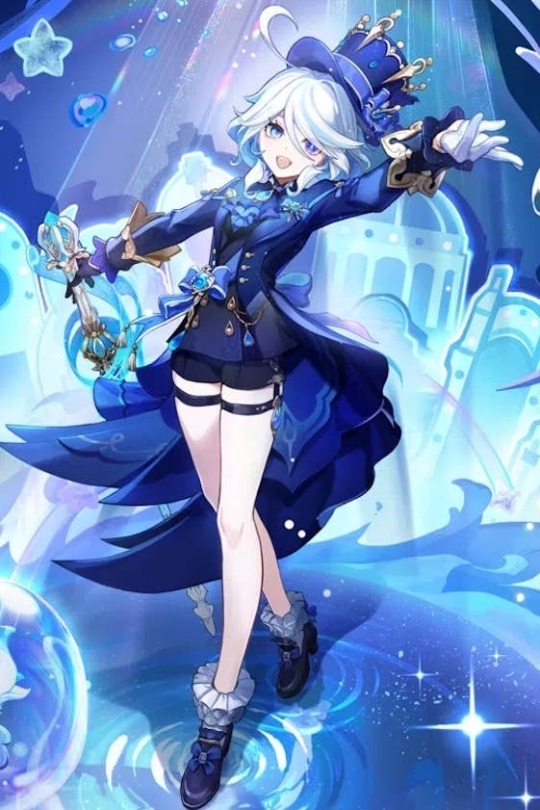
If anyone has seen her leaked kit as well, then it should come as no surprise what I’m gonna talk about now: her Arkhe.
Lyney and Freminet both are Pneuma aligned. Lynette is Ousia. Even Neuvillette is locked to one Arkhe alignment, Pneuma I think (I don’t have him so let me know if I’m wrong).
If I were to make predictions on the not yet released characters, I’d guess Wriothesley, Clorinde, and maybe Navia are all Ousia and Charolette is Pneuma.
But Furina is both: Pheuma and Ousia.
And Furina created the Oratrice, which turns belief into Indemnitium which powers all of Fontaine.
I suspect that Furina’s curse is that she accidentally locked herself into one state, her Pneuma state. Meanwhile her Ousia state is what’s powering the Oratrice.
I also suspect that Furina doesn’t know that. Obviously, when Arlecchino asks her what the Oratrice is for, Furina is unable to answer. That’s pretty much handed to us, but I think what I’m aiming for is that Furina has forgot because of Indemnitium.
So, hear me out, Furina doesn’t have her gnosis right? Arlecchino reveals that she found this out when she tried to assassinate Furina to take it. Yet, in that cut scene, one thing stuck out to me: The Lack of Hydro.
Venti can control Anemo without his Gnosis. Zhongli can control Geo without his Gnosis. Raiden has been controlling electro without her Gnosis. And now Nahida, the youngest and most inexperienced archon, is controlling Dendro without her Gnosis.
But when Furina was almost assassinated, she did not pull out Hydro to defend herself. Without her Gnosis, Furina— as the archon— should be able to control her element still. But she’s never actually seen wielding Hydro, and in a life or death moment I feel like— no matter how incompetent she is— Furina would call upon her powers in some capacity to protect herself. If not making hydro weapons to fight Arlecchino, then making a hydro bubble for Furina to hide in or use as a shield.
Furina is never seen wielding the element of Hydro, and what’s more is that she backs down from every fight. She challenges us, we accept, she backtracks. She yells at Childe, he challenges her, and she backtracks. She challenges Arlecchino on her position as an Archon, Arlecchino rises to that challenge, and Furina backtracks.
I don’t just think the Oratrice has the Gnosis, I think that Furina does have the Gnosis, but it’s not Pneuma Furina. I think, inside the Oratrice, a more competent Furina aligned with Ousia is waiting to be merged back into her real body.
For the longest time I thought the Oratrice was there because Furina wanted literally anything else to do her job for her. Now, I think the Oratrice is made with an entirely different purpose.
We don’t know what the Oratrice does or why it was created, all we know is that it turns the belief of justice into Indemnitium, but we don’t know what Indemnitium is either.
My big theory is that Furina created the Oratrice as a master plan in solving the Prophecy Crisis: she found a powerful source of energy that could potentially rewrite fate itself if enough is harvested. Furina built it and made it’s target on the very thing her godhood is built on, Justice, but didn’t realize that a machine of this great importance and power needs something equally as important and powerful. So when the Oratrice was built, it immediately started searching for justice to convert into Indemnitium. And a god, especially a god with a Gnosis, is pretty much the exact fuel it needs to power up and run forever. The Oratrice aimed to consume Furina herself and convert her into the resource but Furina knew she needed to be alive in order to feed the Oratrice the correct source of power and actually collect Indemnitium. So, Furina split herself in two. Furina’s Ousia side held onto the Gnosis, whether she wanted to or not, while Furina’s Pneuma side escaped without the faintest idea as to what just happened and why.
Ousia Furina is probably only still alive because she has the Gnosis, meanwhile Pneuma Furina knows that the Oratrice is important and that she has to keep up the trials but doesn’t know why or what for.
In the next act/acts, I think Furina— with the help of Neuvillette and the rest of the Fontaine gang— are going to uncover the secrets with the Oratrice, revealing the long suffering Ousia Furina that’s been slowly eaten by the machine of her own creation. Ousia Furina will be absorbed back into Pneuma Furina and, with the two halves combined, Furina will remember what the Oratrice was made for, what Indemnitium is, and will have a huge boost in competence and confidence.
Am I just pulling shit out of my ass? Probably. But if you’ll indulge me, I just personally think the narrative will be better if Furina remains the archon. I feel like Neuvillette was made to be competent, serious, powerful one on purpose: to make everyone point at him and say “He should be the archon!”
And I agree, Neuvi deserves to be the highest authority in Fontaine, and I honestly believe he will be. If Furina steps down as archon, I don’t think she’s doing it for real. If I’m right, Furina is still heavily important to Fontaine because she will have to fill in as the Oratrice. Yet, I can see Furina stepping down for show: a way to make the Fatui back off from her so that they stop targeting a naive and scared girl. If Furina steps down, it’s a win win, Neuvillette doesn’t have to worry about her or her incompetence and Furina gets to go mingle and truly bond with her people as person to person rather than mascot to fans. But I just don’t think anyone can “step down” from being a god. There is no “step down.”
I mean, did Nahida’s story tell us nothing? For years she compared herself to Rukkhadevata. She felt so small and insignificant compared to her, like she’d never catch up. And when Rukkhadevata exhausted her strength, she didn’t just turn from God to Mortal, she went from a big, grown goddess to a little, naive one.
Furina is going to remain the Hydro Archon. It would be a bad move if she somehow wasn’t the god anymore, because we still have the unanswered question of the Oratrice.
IF I AM CORRECT, then Furina will remain the Archon but possibly “step down” for safety reasons. Then, at the end of the Acts she’ll either reveal she still is the Archon or will continue to pretend because it gives her something to use as a shield. Whether publicly or not, Furina will have to take the role of the Oratrice, using her divine powers over justice to confirm the final verdict.
That just ties up so much nicer than “just give it to Neuvillette he’s already doing all the work anyways”
#genshin impact#genshin#furina#focalors#genshin furina#genshin focalors#genshin theory#idk man I should really be doing my homework right now lmao
20 notes
·
View notes
Text
So I’m watching this ‘Person Of Interest’ show. I’m on episode 10. It’s not my kind of thing at all. Like action/crime stuff is just not my thing at all. But for some reason I can’t stop watching it. I don’t really know why either. I mean none of the leads are anybody I’m particularly interested in. All being old white men and all. The black/POC female detective is pretty cool but she’s not in it enough to for me to say it’s her why. I haven’t even gotten to Amy Acker’s first appearance yet. It’s her character and the other POC female character’s enemies-to-lovers relationship dynamic I started watching it for. But I’m not even anywhere near all that yet and I’m still quite enjoying what I’m watching anyway. I just don’t have the slightest clue why. Maybe it’s the good and tight thematic and narrative writing. The themes that are used in telling the episodic stories. Specifically an emphasis on what it means to do the right thing when it really matters.
I don’t know what it is but I’m glad I started watching it because this means when it comes to finally being introduced to the characters I wanted to watch this show for, I know I’m going to be even more invested in it because it’s one thing to have good and tight thematic and narrative writing in a show. It’s another to all have that with great compelling characters along with it. So when it comes time to meet Shoot, I hope that they continue with whatever it is that’s working for me now ‘cause I found that this was a bit of a problem with the last show I watched and finished. The WLW characters I was actually interested in watching the show for had the most screen-time in the last few seasons but the writing itself just really took a dive bomb and I realized that I just was not really into it anymore even with those characters in it so much. I hope this is not what happens with Shoot in this show. I hope that the writing itself can continue being as good and tight as it is now but with them being introduced and heavily involved in the narratives and themes because that’s when I REALLY love a TV show. Especially a show as long as ‘POI’ clearly is.
I’m actually really quite excited for Shoot if this is how good and tight the thematic and narrative writing already is. It’s not usual for me to like a TV show purely based on the writing of its narratives and themes alone. I’m honestly impressed this show has managed to get this reception from me. I guess it also just goes to show how much the writing itself matters in a TV show for someone like me because I can get really turned off even when I really like the characters if the writing is all wrong for them. There’s a few examples.
Season 7 of ‘Buffy the Vampire Slayer’ or what I mentioned above; the last show I watched and managed to finish. ‘Station 19’. When I feel like the writing itself has gone bad, the characterization can’t save it or save my interest in and attention to it. I might still watch it but my passion just disappears. So if a TV show can get me liking watching it before I’ve met the characterization I want to see… then that’s really impressive because I’m a really hard person to please because I have really high fucking standards.
Like I can’t just watch anything. Well, I can … but it doesn’t mean I’ll be passionate about watching it. It doesn’t mean I can write days and day worth of meta on it like Xena or Buffy or Charmed or Wynonna Earp. You know, shows that have characters that make up for any drops in consistent quality writing. Not at all.
No. Because my standards. My average standards…
It’s SEASON 5 of Buffy-level of quality show writing. And there’s not much on this Earth, even to this day, that can match up to a season of TV show writing to the level of Season 5 of Buffy. And anything I could mention that I would consider could is subjective. But ‘Person Of Interest’ Season 1 is really selling it. It is contending even without compelling characterization. I don’t know why or how. It’s just really working for me even though it’s not a genre of TV art/entertainment I would watch and I feel nothing for the lead characters.
So why is it working? Why is it selling it? It’s the good and tight thematic and narrative writing. It has to be. It can’t be anything else because there’s nothing else I’m interested in watching TV shows for except the character representation and development writing - which as I’ve already mentioned - I’m not there yet. So far this is just a TV show revolving around old white men. So it has to be the good and tight thematic and narrative writing episode to episode. It’s real quality. It’s the kind of writing that’s a needle in a haystack to find now because shows are so damn bloody rushed so there’s no time to take in an episode’s deep themes or morals or general written substance whatsoever. No, to find that - you’re looking at a cult classic show. You’re looking at content that’s intentionally written to be both thought-provoking and emotionally satisfying. And that’s WITHOUT the characterization involved.
#person of interest#it’s quite a good show#I don’t know why#but I’m enjoying it#and that can only be a good thing for when I meet shoot#narratives#themes#characterization
5 notes
·
View notes
Note
do you believe in the coffee theory?
I don't, no. In my opinion, it would be a magical bullet, and it would undermine the perfect storytelling immensely. Good Omens is and has always been about overcoming oppressive systems and indoctrination, religious trauma, the entire narrative that the world isn't black and white but a complex pattern of shades of grey.
Crowley fell because he asked questions; he fell because he noticed that things went wrong in Heaven and spoke up about it, stayed true to himself, and got punished for it - but he's free of Heaven's toxicity. Hell might be bad, but at least Hell never covered up that they're the bad guys.
Aziraphale, on the other hand, lives in his own bubble. He knows, and always has known, that Heaven isn't what the archangels want you to think it is, but he has chosen to ignore it, or rather, he keeps holding on to the hope that Heaven can be better because Aziraphale wants to believe in good, he wants Heaven to live up to his ideals. It's very much like being trapped in a toxic relationship, always hoping to change them for the better when in reality, that's not possible.
The very point of these final 15 minutes was the miscommunication between Crowley and Aziraphale.
They both WANT to choose each other - and that's the beautifully tragic point. What Metatron offered Aziraphale wasn't just safety and the opportunity to do what he always wanted: change Heaven, but do it WITH Crowley because in his opinion, Crowley should never have fallen. He wants to stay true to his ideals with Crowley by his side, and he doesn't (want to) see what Crowley has alread seen way before creation and time started: Heaven is rotten. Heaven isn't good, and it can't be saved.
That's how Metatron got Aziraphale: he offered safety for him AND Crowley and the opportunity to turn Heaven into the home Crowley DESERVES without seeing that it was Heaven that never deserved Crowley in the first place, blind to the fact that going back to Heaven was never what Crowley wanted.
Metatron didn't need to spike the coffee - Aziraphale's character is so complex and beautifully developed that his own goodness being twisted against him is enough and, frankly, far more powerful than drugging him into agreeing to the deal.
What Aziraphale did, he did out of love. And if that isn't a very human thing, to do the wrong thing for the right reason, I don't know what is. Perfectly mirrors the scene in tbe garden btw, when Aziraphale gives his flamind sword to Adam and Eve. He does it for the right reason, to protect them, and it's the wrong thing because it ends up humanity's first weapon of war. Beautiful foreshadowing. Neil Gaiman is a genius for that.
I created a Good Omens/Crowley main btw, it's @stargazing-crowley so if you want to talk theories etc, feel free to send asks to this blog please 🖤
13 notes
·
View notes
Text
DINOSAURS! ON A SPACESHIP!
it's the episode Dinosaurs on a Spaceship and I feel like it's the best and the worst of this era in one 45min package, so let's see what it gets right and what it gets wrong
sexism rank objectification (female character is ogled/harassed/turned into a sex joke by the doctor and/or a lead we’re supposed to root for and/or the camera): 2/10
sexism rank plot-point (lead female character is only there to serve plot, not to have her emotional interiority explored): 5/10
interesting complex or pointlessly complex (does the complexity serve the narrative or does it just serve to be confusing as a stand-in for smart, this includes visually): 8/10
furthers character and/or lore and/or plot development (broader question that ties into the previous ones, at least two of these, ideally three should be fulfilled): 5/10
companion matters (the companion doesn’t always have to be there, but if the companion is there, can they function without the doctor– and overall per season how often is the companion the focus or POV of the story): 7/10
the doctor is more than just “godlike” (examines the doctor’s flaws and limitations, doesn’t solve a plot by having it revolve entirely around the doctor’s existence): 9/10
doesn’t look down on previous doctor who (by erasing or mocking its importance, by redoing and “bettering” previous beloved plotpoints or characters, etc.): 6/10
isn’t trying to insert hamfisted sexiness (m*ffat famously talked a lot about how dw should be sexier multiple times, he sucks at writing it): 1/10
internal world has consistency (characters have backgrounds, feel rooted in a place with other people, generally feel like they have Lives): 8/10
Politics (how conservative is the story): 2/10
FULL RATING: 53/100 (if I can count….)
A note: this episode was written by Chris Chibnall and what the hell dude?
OBJECTIFICATION: so where this episode loses me is its near-constant sexual harassment of Queen Nefertiti, who is portrayed as a sultry sexual temptress in the very first scene (trying to get in the Doctor's pants -- there is no context), reacts to misogynistic commentary from a random Edwardian Gameshunter that's in this episode for no reason as if she's turned on, and is then threatened pretty explicitly with sexual assault from the episode bad guy
she then also definitely has sex with the aforementioned Gameshunter, even though - and I cannot stress this enough - almost all his dialogue is truly vile
he's introduced making a sexist throwaway comment to the Doctor about how he'd run off after their last adventure (what is the Doctor doing with a man like this??? idk) and "I had two very disappointed dancers on my hands… not that I couldn’t manage" and right upon meeting Amy and Nefertiti, delivers this banger of "I don’t take orders from females"
seriously why is he in this episode and why would the Doctor be friends with someone like him???? it's an unfathomable choice
all of this is doubly uncomfortable, because he is An Edwardian White British Big Game Hunter From Peak Coloniser Era and she is A Black Woman (who, again, is mostly portrayed as domineering but in a sultry "I want to be tamed" kind of way)
Nefertiti upon getting captured by the bad guy says some shit again about how no man will speak to her like he is, and he pins her to the wall (btw, I will note this in politics, but important to say he is an elderly man walking with a massive space-cane, very much disabled villain Trope) with his massive space-cane and says this in the most leery tone: "I like my possessions to have spirit. It means I can have fun breaking them. And I will break you in with immense pleasure"
of course she gets saved and "takes back" her power by later on defeating him by tripping up his cane, and then her last scene is her with her hair undone coming out of Edwardian dude's tent in [idk the Sahara I guess?] with the big space gun he had
PLOT-POINT: OKAY so originally I was writing here that Amy's story ended in The God Complex and that it was a good ending, and that this felt like they were rehashing old concepts that were already done with
However I do think there's something interesting in Amy being... fine... she worries about the Doctor and would like it if he checked in from time to time so she knows he's not dead or smthin, but at the end of this story Amy and Rory are like "actually we'd like to go home now pls" and the Doctor respects that wish and takes them back and sends them a postcard from his next port of call
so yeah, I think Amy's internal life does matter here, even though I do think her narrative could have all ended on The God Complex and this part of it so far has yet to justify itself (we shall see though!), and I changed my scoring to reflect it. but why isn't it highe-
QUEEN NEFERTITI THAT'S WHY!!! so consistently throughout this episode, we have Amy being quite a capable, fun person and we of course know her and her relationship with her husband and where she is at this point (forget the last episode)
Queen Nefertiti is brought into this episode in order to make a series of sex "jokes," get her kidnapped by the bad guy, and threatened with sexual assault. what does she want? she wants to F***! what's so interesting about her as a historical character? That She Was Sexy! what does she feel about things in the episode? That She's A Powerful Sexy Woman Whom No Man Will Tame And Is No Man's Possession
how did this... do this??? it feels like M*ffat gave Chibnall the note to put in one of his sexual fantasies and Chibnall rolled the dice and landed on Nefertiti on a whim OR WORSE, that he thought she'd pair up well with a British colonialist
it's literally The Thing that makes this episode -- otherwise kind of lowkey a banger -- one that I would never ever recommend, and it's very very disappointing that this kind of racism and sexism was in any draft of the story, let alone the one that got filmed and show on TV
COMPLEXITY: It's got Dinosaurs! and they're pretty great! and it all connects together pretty well -- some Silurians who were trying to escape what they thought was the impending doom of earth and brought different parts of species with them, like an arc, and at some point during the cryosleep journey a malicious exotic trader who literally killed all of the Silurians in order to sell off the dinosaurs
except he can't steer the ship and so it plotted a course back to earth and now it's crashing and they need to find a way to stop him and it!
the only downside is that they didn't make a link between "malicious exotic trader" and "edwardian big game hunter" because the latter absolutely should have been a villain to even mildly justify his presence in this story
Amy even (rightly) says, in answer to him grandstanding about his apparent historical importance: Men who hunt defenceless creatures just don’t impact on history
CHARACTERS/LORE/PLOT: there's some cute stuff with Rory's dad and I can forgive him being introduced in this episode and never before, because it's actually showing him as active in the episode, and gives you an insight into why Rory is the kind of man he is (in a good way)
there's the aforementioned showing how Amy and Rory have kind of grown past the Doctor -- I kind of wish forever that Amy and Rory were more grounded as characters (especially Amy) but at least there's a father-in-law now. I say this because grown past the Doctor into... what? what is their life about? we still don't really know (well, lies, Rory is still nursing, which is great)
it's mainly this set-up -- that the Doctor is going to be increasingly lonely -- that the narrative serves, but it does do it by actually showing Amy and Rory being happy together
COMPANIONS MATTER: they kind of do, yeah. Amy is very competent over on her side of things, in a way I wiiiish we'd seen way back in s5 already, and Rory is the emotional tie to his dad, which makes sense
it is a very "too many characters in one episode" feeling on the whole, but that's because of Nefertiti and the Big Game Hunter, both of whom didn't need to be there, because the bad guy could have stolen the Doctor (I know, I know, the mysteriouuus Oswin has somehow "deleted" all record of him, but could have still scanned him as an unidentified alien or whatever) or the Tardis? and then had Brian and Rory figure out the solution which is what they do anyway and they all team up to save the Doctor or the Tardis....
point being, yes, but there was room for even more, easily
“GODLIKE” DOCTOR: actually not! he does make the decision to let evil guy get blown up, and you know, there's trajectory here, there's precedent so to speak... how one feels about it, ehhh it's up to you, but it's not out of character for this Doctor to do
PREVIOUS DOCTOR WHO: not much of any of that in here -- Silurians again ofc -- and there doesn't have to be
“SEXINESS”: HA. bad. ties into the above points about Nefertiti, truly heinous. introduced trying to have sex with the Doctor/seduce him against the Tardis, and it's sooort of hinted they may have already had sex before??? unclear
also here's some dialogue for you:
Coloniser Dickhead: Egyptian queen or not I shall put you across my knee and spank you [Nefertiti here replies that she will kill anyone who tries, I didn't manage to transcribe it] Coloniser Dickhead: You’re a firecracker [Amy responds to this asking the two of them to stop flirting??????????????????????????????????????????]
later on Nefertiti asks Amy of the Doctor has a queen. Amy asks her isn't she married, to which she responds "male equivalent of a sleeping potion." Coloniser Dickhead then replies that she needs a real man with a Big Weapon, while cocking a massive laser gun
AMY THEN SAYS THAT HE'S A WALKING INNUENDO, BUT LAMPSHADING YOUR OWN SHITTY UNCOMFORTABLE WRITING DOESN'T MAKE IT BETTER OR META??? IT JUST MEANS YOU KNOW IT'S FUCKING STUPID!!!
and of course after her whole adventure being a Sexy Damsel who gets threatened with sexual violence, she's last seen coming out of Coloniser Dickheads tent with a huge gun and a "come-hither" demeanor, but get it... get it she's holding the gun now, so she... idk she doms or whatever, Sexually Confident Girl Power Get That Racist Sexist Mediocre Fuckwit
maybe she's just pretending to seduce him so she can shoot him
(he CANONICALLY kills big animals, presumably the kinds that they sell the tusks of for ivory or can hang the fur of in living rooms or whatever and it's CANONICALLY framed as bad, what is his purpose in this?????????????)
one minor shitty one with Amy (also with this guy????) is they're surrounded by dinos and need to slow them down by stunning them while other shit is happening and he says: Dinosaurs ahead. Lady at my side. Ship about to blow up. not sure I’ve ever been happier
to which Amy simply grins and goes: shut up and shoot
WHAT! IS! HIS! PURPOSE!?!?!?!?!!!!!!
INTERNAL WORLD: it's a fun spaceship that really gives little tidbits to its passengers and their journey (not too much, because they're all sadly dead, and everyone is reconstructing events best they can). nothing complicated, but enjoyable
POLITICS: so we've got a disabled villain, we've got an Edwardian Gameshunter (as a good guy), and we've got some of the most overt objectification of a Black woman I can remember seeing on this show... not a great look for an episode where the plot is simply about none of this, it's just... set dressing on top of what is actually happening
the episode just simply... I mean, look no episode needs to do these things... but this episode didn't even need two of these characters!
if you wanted to bring in Queen Nefertiti, why not do something about her history? about her reign? about her in any meaningful way? why was she here, other than for the sexual content?
why was Coloniser Dickhead here other than to be the perpetrator of most of that harassment and then get rewarded for it? what did we learn about Games Hunters in Edwardian times? what did we learn about British colonisation? and if nothing, what did he bring to the table in any other way? (not everything has to be a learning opportunity after all, but there has to be a reason for a whole fucking character to exist in a thing)
FULL RATING: 53/100 (if I can count….)
this episode could have had such a high ranking for its genuinely fun plot, and for giving us an interesting (if so far unnecessary, but We Shall See) denouement on Amy's and Rory's storyline
as it stands the rampant racist sexism makes it one I just wouldn't recommend unfortunately
7 notes
·
View notes
Note
Hi! Your top 5 best and top 5 worst endings of anything that you liked? Could be TV shows, books, movies, podcasts. Thanks!
hi!! thank you for the ask <3
i generally prefer tragic or bittersweet endings over unambiguously happy ones; this will be long; spoilers ahead (obviously)
best endings
hannibal
the wrath of the lamb fucking rearranged my brain chemistry. how do i explain to people that one of the most romantic things i’ve ever seen was a murder-suicide?
technically hannibal was canceled and not ended but in absence of a season 4, i will consider twotl the ending. i don’t even want a season 4 because i can’t imagine any better ending than the one we’ve got. yes, season 3b was a rushed mess of hannibal, will, and dolarhyde playing fuck marry kill with each other, but they stuck the landing so well, and it’s this perfect tragic mix of “this could’ve all been avoided” and “there’s no other way this could’ve ended”.
and yeah the ending is ambiguous and it’s implied they lived but my favorite interpretation is that they died in each other’s arms.
black sails
wars have been fought over the interpretation of this ending. i personally think john silver is lying but whatever your take, jack’s “a story is true, a story is untrue” speech is brilliant and it’s a perfect ending to a great show
fleabag
“i love you” “it’ll pass” I AM NORMAL.
i love you, female characters written by women. i love you, comedy that turns into tragedy halfway through. i love you, clever use of narrative devices.
this show is damn near perfect, and even though the first thing i did after finishing fleabag was go on ao3 in search of thousands of words of fix-it fic, i wouldn’t change a thing about the ending.
white fang
i wouldn’t say i have a favorite book, but if i had to answer that question it would either be the iliad or white fang. this is the book that got me into reading.
this book caught me at exactly the right time in my life. i was obsessed with wolves as a kid; i was 11 or so, and my grandma handed me this beautifully illustrated book that had the most amazing old book smell (because it’s been in a wooden attic up until then).
it’s about the life of a wolfdog (more wolf than dog) that was born in the wild but gets tamed/adopted into a dog pack that hates him because they can smell he’s not really a dog and hooo boy does something is wrong with you and others can tell that you’re not like them hit when you’re a lonely child.
anywayyyyyy it ends with white fang, having been adopted by a kind man, lying in the sun, still a little confused/out of his element but content. the ending is bittersweet and thematically fitting and he’s a good dog and deserves it.
the mechanisms
the mechanisms are a band of immortal space pirates telling stories of their adventures. their last album is titled death to the mechanisms and in the eponymous song , they realize they’re not quite as immortal as they thought they were. it’s sad, it’s funny, it’s beautiful, it’s poetic, and it’s a worthy send-off.
if you’ve got six and a half minutes, it’s worth a listen (even without context), if only for gems like “witnesses will say that they have never before seen someone so viciously excited to die” or “his body will float there forever, far beyond the warmth of stars” or “pointless, ignoble deaths the lot of them. but who that lived can really boast otherwise?” (this band is so quotable it's insane)
onto the hating!
worst endings
dexter
what the absolute FUCK was that. i adore this show but the ending sucks so much it feels almost malicious
supernatural
i’m not sure i can answer “do you like supernatural?” without a lawyer present. i was obsessed with supernatural as a teenager, then i stopped watching around season 10 or 11. i decided to rewatch the entire thing after november 5th.
supernatural would be so good if it was good. i’m a “supernatural should’ve ended after season 5” truther but i admit that some of the later seasons do have their moments.
not the ending though. the ending is so completely beyond parody i don’t even know what to say. castiel is in superhell for gay angels. dean gets nailed by vampire clowns. when i first saw the aged-up version of sam i literally burst out laughing. at least the wincesties got a forehead touch out of it i guess???? i am so glad that i’ve built up enough emotional distance to laugh instead of rage about this because i know my teenage self would’ve had a conniption.
goethe’s faust and euripides’ orestes
they’ve got nothing to do with each other but i have the exact same beef with both of them so i’m just gonna throw them together.
faust ending: faust loses his wager with mephisto and should’ve by all rights gone to hell but god says ????? (don’t even ask i’m not sure i could explain whatever twisted logic is going on there. something about faust using his devil-bestowed powers for good) and faust goes to heaven anyway.
goethe, my guy, you named the thing faust. eine tragödie. where’s the tragedy i was promised? false advertising. fuck you.
orestes ending: standoff between menelaus and orestes; orestes is holding a knife to hermione’s (menelaus’ and helen’s daughter) throat; this will not end well. or so you thought! at the last possible second, apollo swoops down and fixes everything, tells orestes to marry hermione and ???
nothing is satisfyingly resolved but hey, at least no one’s dead. except iphigenia, and agamemnon, and clytemnestra. this fucking family…
this is what the ancients called deus ex machina and what i call an ass pull.
i just think if you’ve constructed an entire narrative that follows a very clear, specific direction, you shouldn’t then swerve to the left. SEEMS LOGICAL TO ME
and it’s not just philistine bitching on my part btw. there’s actual academic debate about what the hell these authors were thinking. that being said, i’m a hater because i’m a lover, and i wouldn’t be so mad if i didn’t love both these plays
game of thrones
i am sure everyone has heard about how much the ending fucking sucks. from building up the night king to be a badass villain only to kill him in the ass-pulliest way imaginable in one (1) night, to walking back all the character development the characters went through to jon’s heritage being meaningless to having a thus far sympathetic dany snap and burn a city down over literally nothing to jaime and cersei being killed by falling rocks to brandon fucking stark, a character so uninteresting the show forgot about him for a whole season, sitting on the iron throne.
also, euron greyjoy is my favorite character in the books and i’ll never forgive the show for butchering him (i don’t know who the fuck that guy on the screen is, it sure ain’t euron).
one thing that i find fascinating is that it’s literally just the writing that sucks. the costumes are beautiful, the soundtrack is better than the show deserves (thank you ramin djawadi ilu mwah <3), the dragons look great, the actors are doing the best they can. highest production value piece of garbage ever made.
the magnus archives
(little warning bc i’m really mad about this so vitriol ahead. also, i have not listened to the magnus protocol and i’m not sure i ever will)
i yelled about this a lot and i’m ready to yell about this some more!! THIS IS A SEASON 5 HATE BLOG. i’m so serious it’s literally a better podcast if you ignore season 5 and act like MAG 160 is the ending. jonathan ‘the archivist’ sims should’ve had a corruption arc and i will die on this hill, everything E V E R Y T H I N G pointed towards jon becoming a monster and enjoying it. it could’ve been so good!!! instead we got some formulaic bullshit, the concept of (and i cannot stress this enough) parallel universes introduced like three episodes before the ending, and the single shittiest romance i have ever been subjected to. the way martin treats jon is sooo fucking vile and yet the podcast is constantly like aren’t they so cute :) isn’t this soo romantic :) NO IT FUCKING ISN’T. he’s dating his shitty coworker who he doesn’t even like that much why exactly am i supposed to be rooting for this relationship jesus fuck i feel like i’m being gaslit. i don’t just have a notp i genuinely feel like jonmartin ruined the entire thing.
s5 also completely ignored jonah magnus who, apart from being one of the most interesting characters, is THE GUY THE PODCAST WAS NAMED AFTER. but yeah, sure, who cares about him? let's have five more episodes of jon and martin being fundamentally incompatible.
and then there’s the ending where jon is the only one who stands up for what’s right. the podcast tries to act like keeping the fears in their world or releasing the fears are two equally bad choices but the latter is so clearly worse. so clearly the wrong choice to make. AND THEN THEY MAKE THAT TERRIBLE CHOICE FUCK THIS SO MUCH
tma season 5 is one of those cases where you can so clearly see the potential of something that could’ve been so great and they just threw that away AND FOR WHAT
(ok i’m done yelling about this now. just kidding i’ll never be done)
4 notes
·
View notes
Note
Oh, i dont mean to overstate potters cruelty or agency in this matter- he cant let charles or klinger go at all and its true that charles is a prick. But to me there always felt like there was a tension to me as a viewer where the show invites you to laugh at charles's and klinger's expense when they make attempts to leave that potter stops. Cus the show knows charles and especially klinger are very well justified in their desire to leave. To me it brings about this sort of intersting disonance, not in a bad way so much as a complex and interesting way that enriches the text. Potters the voice of reason and the authority figure the narrative defers to, especially in the later seasons, but his general feeling on these matters is resignation. "It is what it is" "it cant be helped." That resignation certainly isnt wrong or bad- hes being practical. But its hard to sympathize with it over hawkeye or klinger or even charles's rebellion.
As for going awol as an immoral act i suppose i was mostly thinking of various episodes in which people encourage a soldier to return to the front. I believe mulcahy encouraged a young man whod stolen a dead comrades identity in order to escape the army to return to the front. He also spent a whole episode trying to convincea kid who was trying to come home after his fiancee left him that he needed to return to the front. The show always shows characters being reluctant to do that sort of thing, but later on in the show i feel a real sense of resignation to that status quo. Idk if thats making sense but ive been thinking about it a lot. I feel like MASH's castwide emotjonal arc as a whole often concerns itself with the tension between rebellion (which runs the risk of being unrealistic or dangerous) and resigning yourself to reality (which runs the risk of being callous or despair inducing) i personally feel that the show tends to strike a really good balance, but theres something really interesting to me about the fact that, in my opinion, potter (who is loved by pretty much the whole staff and is generally considered the voiceof reason and wisdom) is also the most ardent voice of resignation if that makes sense? Hes wonderful and smart and more often than not hes right- rebellious acts are unrealistic theyre dangerous they cant be done without serious repercussions, the best way to do good is within the system and slyly- not because its the best way to do it but because it is the most effective way to do it without being destroyed by the powers that be. Him being smart or empathetic or reasonable doesnt make him any less oppositional to the spirit of spitfire rebellion that hawkeye embodies it. Potter dampens that. Perhaps thats by necessity for fear that hawkeye burns out, but to me that sort of effect feels more complicated than good or bad. Potter's mediating presence is an expression of care- he is a buffer between his unit and the cruel beurocratic military machine. But making the weight of the armys control easier to bear normalizes it- it puts a kind paternal face on the military authority they are all bring crushed by. The fact that he truly cares and is working within the system in the manner his is doesnt really lessen thar to me- which doesnt make potter villianous or wrongheaded so much as it complicates his approach at least to me. (Sorry a million billion words. Poter thesis to me- i love him i think hes great and his ideological position in the show is rlly interesting)
i don't think the narrative defers to potter as thee authority figure necessarily - he's the "good" army man and the show has to marry this with hawkeye's (and, in turn, the show's) anti army sentiments, which it does with various degrees of success
i do agree with everything else you said though! the mulcahy thing has always confused me a bit too, like sometimes they give him this black and white thinking and sometimes they give him complex moral problems (if i remember correctly, his opposition to the soldier who stole a dead man's identity was that the dead family won't ever learn that the man died, not that the soldier won't return to the front). and there's the episode where he tries to shelter a soldier who's AWOL simply because the soldier requested sanctuary
#the show does walk a thin line on how much rebellion it allows because well. its tv in the 70s#and of course the political tone of the show does mellow out after gelbart#mash#long post
7 notes
·
View notes
Text
El Final Jefe’s Bitácora Entry 2 — The Real Truth About Immigration and What I Would Do (Uncensored, Unfiltered, Unforgiving)
By:
Sky
Zane Theodore Phoenix
Phoenix Knight
Phoenix God
The Scapegoat
The Final Boss
The Status Quo Slayer
Music God
Fantasy Football God
President of Phoenix Empire Incorporated
King of the Phoenix Empire
El Final Jefe
---
Let’s fucking go.
Immigration.
Even the word has become radioactive. You can’t say it without the vultures circling. Politicians foaming at the mouth. Media corporations drooling over the next clickbait headline. Keyboard warriors prepping their 30-comment meltdown. Why? Because no one’s actually interested in solving the issue. They’re interested in owning the narrative. Twisting it. Weaponizing it. Sucking the humanity out of it and shoving it into a red vs. blue meat grinder.
Let me break the fucking fourth wall for a second—you’re all being played.
They told you America is the land of opportunity. Facts.
They told you America is a nation built by immigrants. Also facts.
But here’s what they didn’t tell you: America was stolen before it was built.
The blood of Native Americans still screams beneath this soil. The echo of genocide wasn’t some tragic accident. It was a blueprint. Columbus didn’t discover shit—he invaded, he enslaved, he slaughtered. He is not a hero. He’s a war criminal with a fucking holiday.
And if that offends you? GOOD.
It should.
But I’m not here just to drag skeletons out of the closet. I’m here to torch the entire fucking mausoleum. Because the immigration crisis we face today isn’t about borders or buses or benefits—it’s about truth vs. bullshit, and the bullshit is winning.
You’ve been lied to.
Over and over and over.
The left tells you anyone who wants borders is a racist.
The right tells you every undocumented immigrant is a criminal.
Both are lying through their surgically whitened fucking teeth.
Let me speak now not as a media figure, not as a politician, not even as a commentator—but as the Final Boss of this whole damn game. I’m stepping out of the shadows with a flame thrower and a megaphone.
Here’s the truth:
No one—and I mean fucking NO ONE—is saying all immigrants should be deported.
If you actually believe that, then congratulations—you’ve been brainwashed.
You let the fear-porn from Fox News or the guilt-trips from MSNBC turn your brain into pudding. You think “immigrant” means “threat” or “victim” and nothing in between. You’ve been taught to view this issue as binary. Black and white. Right and wrong. Red and blue. Patriot and traitor.
You’ve been fed a fucking illusion.
What real people are saying—and what I said loud and clear during The Week of Hell episode of State of the Real Union—is this:
Immigration has to be done RIGHT. And LEGALLY.
Because guess what?
Laws matter.
Process matters.
Fairness matters.
You don’t get to scream about fairness and justice while bypassing the very system you expect others to respect. You don’t get to demand rights while flipping off the rules everyone else had to follow.
I played the clips. You heard them. Legal immigrants—Haitian, Colombian, Dominican, Filipino, Mexican—standing up and saying: “We waited. We paid. We did it right. And now it’s being spit on.”
They’re not anti-immigrant.
They’re anti-injustice.
Big fucking difference.
Now let me make something very fucking clear, once and for all:
I don’t give a flying fuck what race you are.
I don’t give a flaming fuck who you sleep with, what you worship, what pronoun you use, or where you were born.
If you are a decent human being…
If you work hard, stay out of trouble, help your community, and treat people with basic human decency?
Then I want you here.
I welcome you with fire in my soul.
I will stand by you against every bigot, every scumbag, every bureaucratic obstacle.
But if you are a predator—
If you are a rapist, a child abuser, a murderer, a trafficker, a gang soldier, a drug-slinging terror?
Then I don't give a damn if you're white, brown, black, purple, straight, gay, or a unicorn.
You don’t deserve mercy.
You don’t deserve a second chance.
You deserve a fucking eternal exile, locked in a dungeon with no door, no key, no light.
You are not entitled to protection just because you're a minority.
You are not shielded from judgment just because you’ve suffered.
Being oppressed doesn’t give you the right to oppress others.
Let me say it loud for the virtue signalers in the back:
YOU. ARE. NOT. ENTITLED. TO. SHIT.
Laws exist for a reason.
They are not suggestions. They are civilization’s spine. Without them, we’re animals with TikTok.
Now, here’s what I would do.
If you’re undocumented, but you are working, not committing crimes, and clearly trying to make a better life?
You stay.
You are not deported.
BUT—
You are fined $200/month until you become legally validated: green card, visa, dual citizenship, whatever the process demands. Why? Because choices have consequences. But unlike the current system, mine gives you a path. A light. A deadline. You’re not drowning in red tape. You’re climbing toward legitimacy with purpose.
And I’m not gonna let the government profit off your suffering endlessly either. That $200 doesn’t go to bureaucrats. It goes into a Citizenship Accelerator Fund—a pool used to streamline processing, expand language services, hire immigration lawyers, and protect families trying to do it right.
Now let’s flip the coin.
If you are committing violent crimes, exploiting the system, involved in organized criminal activity?
You’re gone.
Not just deported—banished.
You don’t come back. Not through the wall, not through the sea, not through legal loopholes.
Phoenix Empire justice is swift, final, and absolute.
And to make all this work?
Yes—we need border security.
But not this archaic, barbed-wire, watchtower fantasy.
I’m talking modern. Strategic. Tech-driven. Smart surveillance. Biometric systems.
And most importantly?
An online federal immigration portal.
One place. One site. All languages. Full transparency. Easy applications. Direct contact with case workers. Regular updates. Secure uploads. One-stop citizenship progress.
Why do we make immigrants navigate a maze of bureaucracy when we order fucking tacos from a drone?
We need to stop pretending like we don’t know how to fix this. We do. But fixing it doesn’t benefit those in power. Chaos is the currency of kings—and I’m here to bankrupt them.
---
Let me close this like only El Final Jefe can.
This country doesn’t need open borders or closed hearts.
It needs open eyes. Open ears. And ironclad integrity.
We are not a nation of cowards.
We are not a nation of leeches.
We are a nation of Phoenixes—meant to burn down what’s broken and rise again, wings blazing.
To every immigrant trying to build a better life—I see you. I salute you. I stand with you.
To every predator hiding behind identity politics—I will find you. I will expose you. I will crush you.
This is the Final Boss Era now.
No more lies. No more games. No more excuses.
---
Long live the scapegoat
Long live the empire / Larga vida al imperio
Phoenix Empire forever
Phoenix God forever
Phoenix Knight forever and always
Final Boss Engaged
El Final Jefe activado
🔥🛡️🦅🇺🇸
0 notes
Text
there have been a few responses echoing this and i've been avoiding responding but i think i want to take a crack at it now.
the defense of Van Hollen's words that i keep seeing over and over again almost always centers exclusively on the idea of "due process" as opposed to explicitly defending Kilmar Abrego García as a human being. this kind of weird hyper focus on due process and due process alone just blatantly ignores the material and ideological violence that is inherent in treating marginalized people as abstract court cases rather than fully realized individuals with hopes and dreams and lives.
Van Hollen not wanting to unconditionally affirm García's humanity even while advocating for his rights is (another Democratic) capitulation to the racist logic that conditions public empathy on the "perfect victimhood" you mentioned yourself. it just winds up reinforcing the systemic dehumanization of brown and Black people in the long run, which conservatives in turn exploit to justify state violence. the fact that he is being insistent that he's "not defending the man" - despite his lack of convictions, his family’s testimony, and the administration's OUTRIGHT admission of wrongful deportation - directly provides ammo to the right. by reducing Garcia to what is basically no more than a legal abstraction, he implicitly validates the premise that García could be guilty of being in MS-13 when it's already been found that he is not. racialized oppression places unreasonable demands on marginalized people that they must prove or earn their humanity through flawless conduct, while whiteness is typically afforded this kind of charitability without prompting.
furthermore, while you're not really wrong that "it’s not about him, it's about the fact that anyone can be deported without due process," this distinction is a tired liberal fallacy that i've already railed about before 100 times. probably not for the last time: rights cannot be divorced from the people who hold them. to say "I defend his rights, not him" is to in turn concede that Kilmar Abrego Garcia's humanity is negotiable which once again is a concession that conservatives will exploit to erode those same rights.
you need to understand that the lexicon of liberal politics seeks to strip human rights of material context and detach things like due process from dignity. this is class warfare. it winds up creating a permission structure that normalizes oppression. if Democrats do not link Garcia's rights to his humanity, they surrender ideological terrain. conservatives do understand the power of this narrative and in turn, they flood the media with pictures of his tattoos and how he's an abuser because they understand perception shapes reality. you counter this effectively by centering the man's lived experience as a refusal to let the state define who is "human" enough to deserve rights, not a shallow sentimental appeal.

yeah.......... i truly hate the democratic party with everything i have in my soul. all he had to say was "yes, i'm defending this innocent man because he did nothing wrong but come to america seeking a better life" and he couldn't even do that. naturally the comments i've seen say shit like "i don't have to agree with you but i'll defend your rights" and i ask once again what are we disagreeing with Kilmar Abrego Garcia on???????? what did he do besides be brown and have tattoos???????? why shouldn't we defend him??????? oh my god this fucking country
5K notes
·
View notes